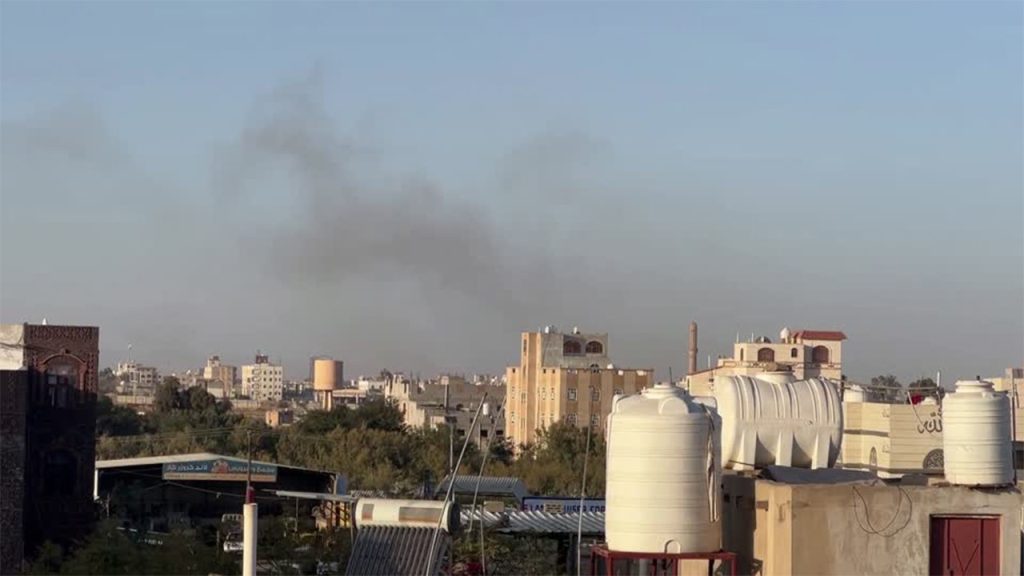The escalating conflict between Israel and the Houthi rebels in Yemen reached a new crescendo with a series of Israeli airstrikes targeting the Houthi-controlled capital, Sana’a, and other strategic locations. The Israeli Defense Forces (IDF) confirmed responsibility for the strikes, asserting that they were aimed at dismantling military infrastructure utilized by the Houthis to orchestrate attacks against Israel. The IDF specifically mentioned targeting Sana’a International Airport and power stations in Hezyaz and Ras Kanatib, along with port infrastructure in Al-Hudaydah, Salif, and Ras Kanatib on Yemen’s western coast. These strikes were portrayed as a direct response to the Houthis’ persistent aggression against Israeli territory, which has included numerous UAV and missile attacks.
The IDF’s actions followed a recent missile attack launched from Yemen that struck Tel Aviv, injuring sixteen people. This incident marked a rare failure of Israel’s sophisticated defense systems to intercept an incoming projectile and underscored the growing threat posed by the Houthis’ long-range missile capabilities. The Tel Aviv attack fueled a surge in calls within Israel for a more forceful response against the Houthi leadership, mirroring previous Israeli operations against leaders of Hamas and Hezbollah. Israeli Defense Minister Yoav Gallant issued a stark warning, vowing to cripple the Houthis’ strategic infrastructure and eliminate their leadership if the attacks continued.
The Houthis, who control a significant portion of northern Yemen, have been engaged in a prolonged conflict with the internationally recognized Yemeni government, supported by a Saudi-led coalition. Their involvement in the Israeli-Palestinian conflict has manifested in repeated missile and drone attacks targeting Israeli territory, often in solidarity with Hamas, the Palestinian militant group controlling the Gaza Strip. The Houthis’ actions have significantly escalated since Hamas’s October 7, 2023, attack that killed 1200 people in Israel. Beyond targeting Israeli territory, the Houthis have also disrupted international shipping in the Red Sea, launching attacks on dozens of commercial vessels, particularly in the Bab-el-Mandeb strait, a crucial maritime passageway.
The Houthis’ targeting of commercial vessels in the Red Sea adds a new dimension to the conflict, raising concerns about the security of international trade and the potential for wider regional destabilization. This strategic waterway is vital for global commerce, and the Houthis’ attacks pose a direct threat to the free flow of goods and resources. The disruption of shipping traffic could have significant economic implications, impacting trade routes and potentially leading to increased costs and delays in the delivery of essential commodities. The international community has expressed growing concern over the Houthis’ actions, urging all parties to de-escalate the situation and ensure the safety of maritime navigation in the region.
Israel’s response to the escalating Houthi aggression has been marked by a combination of targeted airstrikes and increasingly strong rhetoric from its leadership. Prime Minister Benjamin Netanyahu echoed Defense Minister Gallant’s warnings, emphasizing the government’s commitment to taking decisive action against the Houthis, albeit with a call for patience as the military develops its strategy. Netanyahu drew parallels between the current situation and Israel’s past confrontations with Iranian-backed groups, signaling a potential shift towards a more aggressive posture against the Houthis. This approach aligns with Israel’s broader regional strategy of countering Iranian influence and preventing its proxies from acquiring advanced weaponry and posing a direct threat to Israeli security.
The escalating conflict between Israel and the Houthi rebels presents a complex and volatile situation with potentially far-reaching implications. The Houthis’ increasing missile capabilities and their willingness to target both Israeli territory and international shipping raise serious concerns about regional stability. Israel’s resolve to respond forcefully to the perceived threat, coupled with its history of targeted operations against militant leaders, suggests the possibility of further escalation. The international community faces the challenge of mediating a de-escalation of hostilities and finding a sustainable solution to the Yemeni conflict, which has become increasingly intertwined with the broader regional dynamics and the ongoing Israeli-Palestinian conflict. The Houthis’ actions in the Red Sea further complicate matters, threatening international trade routes and potentially drawing in other actors concerned about the security of maritime navigation. The situation remains highly fluid, with the potential for further escalation and unforeseen consequences.

